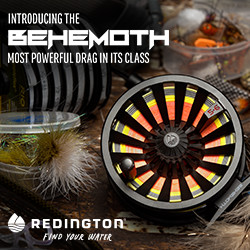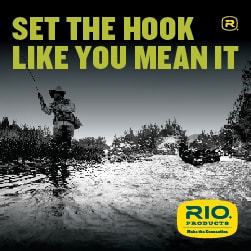Vice Presidents, Museums, and the State of Our Sport
 Tuesday, May 26, 2009 at 12:06AM
Tuesday, May 26, 2009 at 12:06AM Our new friend Dr. Sam Snyder was kind enough to share his thoughts and perspective regarding the Cheney invite to the American Museum of Fly Fishing. Sam is a Professor of Environmental Ethics, a John Daniels Fellow and passionate angler, we're honored to bring his voice to the dialog.

It took me a while to actually put these words down. I wasn’t quite sure about how to handle it all, particularly in the midst of my deep respect for the American Museum of Fly Fishing (AMFF) and all that it stands for - and, in part, because the AMFF supports academics and historians of environmental politics like me. But as one deeply engaged in the history of fly fishing’s environmental politics, the choice of Dick Cheney as the keynote speaker for the annual fund raising dinner deeply troubles me, like it does many others. Beyond my own personal struggle with this choice, however, I think the whole issue gets to larger questions we must all grapple with if we take our sport and its streams seriously.
So, here are a few thoughts:
As both a member of the AMFF and one who has spent many hours in their library, I was surprised that I first heard of this choice, not from the AMFF, but from our friends at Moldy Chum (by way of Ted Williams’ thoughts on the matter). I was outraged! My mind turned not to Cheney’s fly casting or hunting abilities (or lack thereof), but to his environmental record. Seriously, I thought, here is a man who repeatedly ignored varied global human rights accords – so the rights of nature were clearly out the window. Despite a sketchy track record of environment and species protection, those in his camp, such as James Connaughton (the former chair of the Whitehouse Council on Environmental Quality under Bush and Cheney), will tout 195,000 acres of marine protection as proof that the Bush/Cheney environmental legacy is defined by “unbouding results.” However, what the politicians fail to note is that those acres of marine protection were traded for an even larger acreage of old growth forest, roadless areas, pristine streams, and endangered species habitat (among many other sins) – all vital to the future of our odd little sport. So, yes, I was upset to see this bit of news regarding Cheney’s invitation. However, when I paused to reflect on it all, I was simultaneously not entirely surprised – which is, in part, what intrigues me. In some ways, I am curious about what the angry response says about us and our views of our sport, as much as it does the issue. Why does it bother us so much? Should we be surprised, really?
It bothers us, because the AMFF is supposed to be one of the hallowed locations of our sport’s history and some of us perceive Cheney as the antithesis to all that we hold dear in our fly casting hands: fish, clean waters, and protected habitat. Despite Ted Williams stating that the “entire fly fishing community is disgusted” with this choice, I suspect that those of us who hate all that Cheney stands for are, in reality, the minority in fly fishing and larger
sporting communities. The entire community is not disgusted, only a few of us. Which is why the AMFF’s choice is not all that surprising.
While numbers might have shifted in recent years, in reality most American “sportsmen,” have supported the likes of Cheney, even in our beloved circles of fly fishers. In part, I believe this is what is so disappointing about it all. We realize that many fly fishers and other sportsmen and sportswomen openly support those who do nothing good for the habitats in which we seek our varied and adored species. So, while in the media, on sites like Moldy Chum, or various blogs, Facebook, Twitter, etc., many of us (myself included) have “vocally” protested the selection of Cheney as keynote speaker, there were probably a great number who saw nothing at all wrong with, or even applauded, the choice. After all, he was a vice president who really does enjoy fly fishing (regardless of how good he might be at it). And the collection of presidential angling memorabilia at the AMFF is, for sure, impressive and unique. So in some ways, I don’t necessarily fault the AMFF.
And, my disappointment aside, I will continue to support the AMFF. They have been immensely helpful and gracious with me when I wanted to work in their library for my dissertation research and when they published my work in their journal. However, most importantly, deep down inside I believe in what they stand for in a grander sense. This history is imperative. The history is so significant that I think we should all support it, for reasons I will note below.
Thinking about numbers I wonder how many who are complaining actually support the AMFF financially. The total membership (which costs a mere $40 annually) of the AMFF is barely 2000. This is a paltry percentage of our larger fly fishing numbers. I know, I know. We can’t support every TU, FFF, or other non-profit cause that comes our way. However, if we don’t (or do) like their choices, perhaps we should get more involved. After all, they do watch guard over the material artifacts of our sacred history.
But back to the AMFF. What I have the most problem with, however, is their response to the issue. Beyond the way they handled it, I take issue with their response statement: “Although we work with conservation organizations, conservation is not our issue” (AMFF Director Catherine Comar). While I believe this message is one handed down from the board, and like the choice of Cheney, Comar had little say in the matter, I also believe that the statement is utterly fallacious.
It is fallacious because you cannot separate the very important historical artifacts housed in the AMFF from the issue of the environment and conservation. Their separation, in this case, seems a convenient move for the museum and the moment. In reality the claim is illogical. At the AMFF, in its galleries, on its book shelves, and in its storage rooms, we find the sacred artifacts of our sport (rods, reels, flies) and the stories (both published and written in personal journals) – all of which track the growth of technologies, shifts in rod building, and advances in fly tying. Throughout all of that, however, we also find details of the evolution of our varied ethics and relations to nature, streams, and the fish we pursue with religious passion.
So, to the AMFF, its leadership, and the executive board, I politely argue that you are wrong; the AMFF has everything to do with conservation. This is why I and so many others are drawn to your cause in the first place. Now, I am not asking you to be out rolling boulders, planting willows, and restoring native species. That is, for sure, the work of groups like TU, FFF, and the countless and invaluable grassroots organizations who are getting it done on our streams. However, I hope that you recognize the fallacy in your claim. Everything you do has to do with the preservation of our sport’s history. And, therefore, has everything to do with the conservation of the waters out of which the sport’s history hatched.
It is for those same reasons, however, that I will continue to support your work and the overall aim of the AMFF, all that it represents, and all that it means for understanding how we have grown as anglers and conservationists; where we have gone wrong, and how we can learn from those errors to continually improve our ways of relating to the waters and species that mean so much to us. I hope we all will. If your choice of Cheney angered so many, then we need to get involved and direct the future of the place that protects our holy artifacts.
Sure, I know that many reading this, many in my generation of anglers, are more intrigued by blogs, big fish, flashy pictures, and sexy films. Antiques and museums are not necessarily that cool. I get it. But we must never forget our history – Halford, Haig-Brown, Marinaro, Schwiebert, and so many more. These are the figures who have truly pushed our sport’s boundaries both in terms of techniques and our ethics of conservation. This is why places like the AMFF are so very important. Don’t get me wrong. I, too, love all the great new movies that attempt push our sport deeper and deeper. I support and admire sites like Moldy Chum - I start every morning with a dose of coffee and molded chum. I think that what B2 and EJR are up to is great. However, we must also note that amidst their big pictures, humor, and boundary pushing angling, they profess an important message – fly fishing done “Reel Pure!”
No matter how deep we push the sport, we have to remember and understand that we come from a long, varied, and inspirational history of both famous and anonymous anglers. The stories of that evolving “reel” purity are what places like the AMFF tell. And, by paying attention to that story, we can, as Teeg Stoufer (Recycled Fish) says, all “become better steward of our streams” . . . and our sport. Therefore, in working toward that stewardship, we must all, the AMFF included, remember that in our quests to push the depths of fly fishing, history and conservation are inseparably essential.
I have to thank Teeg Stouffer and Brian Bennett (a.k.a. B2) for encouraging me to finally finish putting these thoughts into words. Also, thanks to B2, EJR, and Moldy Chum for throwing these thoughts out to the fly fishing community. If anyone has any replies on my thoughts and rants, I would love to hear from you (snyderaway@gmail.com). I currently teach environmental ethics at Kalamazoo College in Michigan, I am moving to Alaska in the fall, and in spring 2010 I will be the John H. Daniels Fellow at the National Sporting Library, where I will continue to explore the deep story of our sport’s history and its evolving environmental consciousness.







Reader Comments (39)
Ken - very good post with very good points. But who is to determine the "more than my fair share" factor. My place is tiny compared to mosts land holdings, and it has created a place for my family and friends to enjoy first class hunting and fishing on land that was previously used only to graze cattle.
The simple fact is that in a fair and real market enviornment oil is the best energy source we have. Wind, solar, etc can't touch it. If you want to talk about destruction of our land and natural resources take a drive out to a wind farm.
I've already "clawed my way out of the grave" of an impoverished past. A $600 fly rod was more valuable than my mother's paycheck. Work harder, work smarter, the steady plotter wins the race in conservation, in business, in life.
Someone please refresh my memory - what exactly are the atrocities of Cheney evil reign?
Independent petroleum professionals are not poisonus villians - quite the opposite. None of my associates are trust funded, blue blooded train wrecks. Ken, it seems that many folks like yourself are quick to poke fun at Texans, classifying us as dumb and uneducated, yet our state continues to thrive through this recession. Most of the uneducated Texans are Mexicans residing here illegally.
The harder you work, the luckier you get.
Who is John Galt?
uh...jr. i'm a texan. and n my 4 decades of texan experience, i would say there r an awful lot of white and black "uneducated" types n texas, too. of course, i would also say a whole helluva lot of them have college degrees and at least high school dipomas. so i don't like the word "uneducated." and i wouldn't confine the debate to the state of texas, either. but that's another discussion altogether. u really only made 1 point worth addressing: who defines more than one's fair share? divide the world's resources by the world's population. it's pretty simple. b4 u label me a communist (since u already fatally assumed i wasn't a fellow texan), let me emphatically state that i am all for an unbalanced distribution of wealth, however. i'm just not for an unbridled one based purely on competition. we are, after all HUMAN. the thing that suposedly separates us from the lower animals is our capacity for compassion and subordination of self and the "now" to the ideals of humanity as a whole and a better tomorrow. too much of an imbalance between u and those mexicans u mentioned (based on where ur property lies and the geopolitical realities of the situation) and they'll simply take it from u...whether there's a prez obama n the picture or not. nature strives for balance at the same time that creatures within nature compete for scarce resources. both natural principles should never b forgotten.
p.s. judging from ur sig line, u should hav known better than to make the texan mistake. ;)
Ken - we have different political views so I can agree to disagree. I'll leave the political posts to the political blogs. My posts sound cold - which are often the problem with posts (by the way my steps 1-6 post was not my steps 1-6 for living life). I'm pretty sure we are involved in some very similar service oriented organizations.
I'm not sure about the wink. I think you may have me confused w/ someone else?
yeah, perhaps another south texas, oil industry, ayn rand fan who posts on fly fishing sites. my bad.
Parts one and two are correct, part three incorrect. I'm reading Atlas Shrugged for the first time and I'm only 300 pages into a ~1200 page book....strange?
ah! there is another texas fly fisherman who uses that n his sig line on fly fishing websites. and i'm pretty sure he's also n the oil-n-gas biz. maybe tech biz, tho.
We argue this from an ego-centric and thus fallacious point of departure. That point being nature as it relates to our own [mans] experience of it. Gauged by the parameters of our own infinitesimal timeline.
Nature’s course evolves within the scope of a timeless narrative. It was here before us, and it most certainly will be here after we have gone the way of the dinosaur.
Best articulated by the essayist and poet John Haines:
"Of one thing we may be certain: Nature will cure everything given sufficient time and neither the earth nor the cosmos requires our presence to fulfill itself…we can destroy ourselves, render obsolete and useless all our mechanisms, but that is all. Our inflated claims and expectations amount to very little in the face of that primary perception."*
When we realize that we are not fighting for fish, or water, or mountaintops, but rather fighting for ourselves progress will be made.
The primary perception. Wise.
* Cited essay appear in Haines' collection of essays, Fables and Distances, ©1996 | Graywolf Press
This is particularly to Jr. - I just want to quickly note that the critique of Cheney on the grounds of environmental issues has, at times, little to do with his oil background. It has to do with the ways in which the Bush/Cheney administration opened up roadless wilderness to logging, worked to removed the teeth of the clean air act, opened up clean water regulations for increased pollution, and tried really hard to gut the Endangered Species Act, among other things. On the issue of oil, they actually did one good thing by banning oil exploration in the preserve of the Valle Vidal in Northeastern New Mexico, so not all the eco-critique of Cheney is about oil. Granted, their move on the Valle Vidal, was the response to loud and vocal lobbying by a diverse, multi-stakeholder group of concerned citizens - led by hunters and anglers.
By the way, oil was never mentioned in that article - just all of the above points on the environment.
Opinions are like you know what. Most flyfisher's have a great respect for
conservation issues but understand the need for balance, thanks oilman.
Frankly, I am discouraged I wasted my time reading yours.
Only an academic could think he could get away with the blatant bias revealed in the fourth sentence of a ten paragraph piece intended to be persuasive and ostensibly factual. The writer’s assessment of Cheney’s compliance with human rights accords (which is in itself a red herring) has nothing to do with his position as a conservationist or his suitability as a guest of the AFFM. Although I was a Bush/Cheney supporter generally, I didn’t always agree with the administration’s environmental and cold water fisheries policies. I may have agreed with the writer on some points but couldn’t get past the fourth sentence. Shame on you professor—we will never learn to have productive dialogue on these issues until people like you can separate the conservation issues from the rest of your political agenda.
S Burrell
Yours is the first critical response to make me pause. Point well taken. The trouble is, this was an op-ed piece and I allowed my opinion to lead into the conversation, rather than getting straight to the issue: That we cannot separate the history of fly fishing from the work of conservation.
Might I point out, however, that academics are not the only ones guilty of such transgressions; so let us all do a better job of avoiding the red herrings.
Best
ss
I find the hateful tone of your post to be sad. In fact, AMFF is museum and not an environment organization. If it were, most of the founding parents of our sport would not be considered worthy to be included. Mary Orvis Marbury’s book is full of “killing flies” and not a word about catch and release.
Today most fly fishers don’t consider their love of the sport a religious passion, or its’ history to be filled with sacred artifacts. Rather past time that we enjoy and are willing to work to help ensure that the water and fish will be there for future generations.
It is your hate and religious zeal that drives people away from your causes, not the cause. I, for one, am tried of the fear mongering and hate, and will not spend one dime of my money or one minute of my time to support anyone or organization that uses either to promote their cause.
Get a gip! Cheney is not the devil and it is only a speech.
This is a site filled with intelligent and literary writers. I am going to try and keep this simple. Bush bought votes from sportsmen by supporting old school fear mongerers such as the NRA and by inviting all the heads of major sportsman's organizations to his ranch to bass fish. Let's see, the former head of the NWTF, Mr. Ego, and BASS PRO and a few others. They flocked dow there to be seen and filmed with a President. In the meanwhile, Bush and Cheney sent environmental issues back 200 years by destroying habitat and disregarding scientists and sucking up to businesses.
As far as the chap in Texas who has some well stocked tanks and the fish around his end of Texas coming back, it has nothing to do with Bush, or maybe it does. If you have enough cake to buy your own bass ponds and yammer about the "hammer and sickle" that means you care nothing about anyone but yourself, or big business. That's typical of the party that saw the 9/11 criisis, the real estate crisis, the finanacial crisis, and death of some of the biggest companies in America. All during your parties watch. Good looking out.
Holding Cheney responsible for distasteful environmental policy is akin to blaming Wagner for opera not being in English. Cheney only cast votes in tie-breaker roles. None of them were on environmental issues.
Exhibiting your political persuasion as a tirade against a particular political figure seves nothing but the venting of your spleen. Cheney's only unique sin is being visible as both a fly fisherman, hunter, and member of a politcal movement that did not please you, or Ted Williams, or many others. Cheney's primary transgression lies with the prioritizing of environmental issues relative to all of the tasks of governmental management. Keep in mind he never received the assignment of establishing policy for which he is allowed to claim credit. Pinning one individual with all of the negativity of the politics of the time is absurd.
Some believe that fly-fishing president, Jimmy Carter, should be charged with treason for his dalliances with anti-american politcal unsavories in defiance of current office holders. That strong opinion bears no impact upon Mr. Carter's validity as a friend to fly fishing as a sport. Neither should Cheney's politics; Nor mine, nor yours.
I applaud the museum for not submitting to partisan politics masquerading as environmentalism.
Let not political affiliation become a criteria for being regarded as an angler.